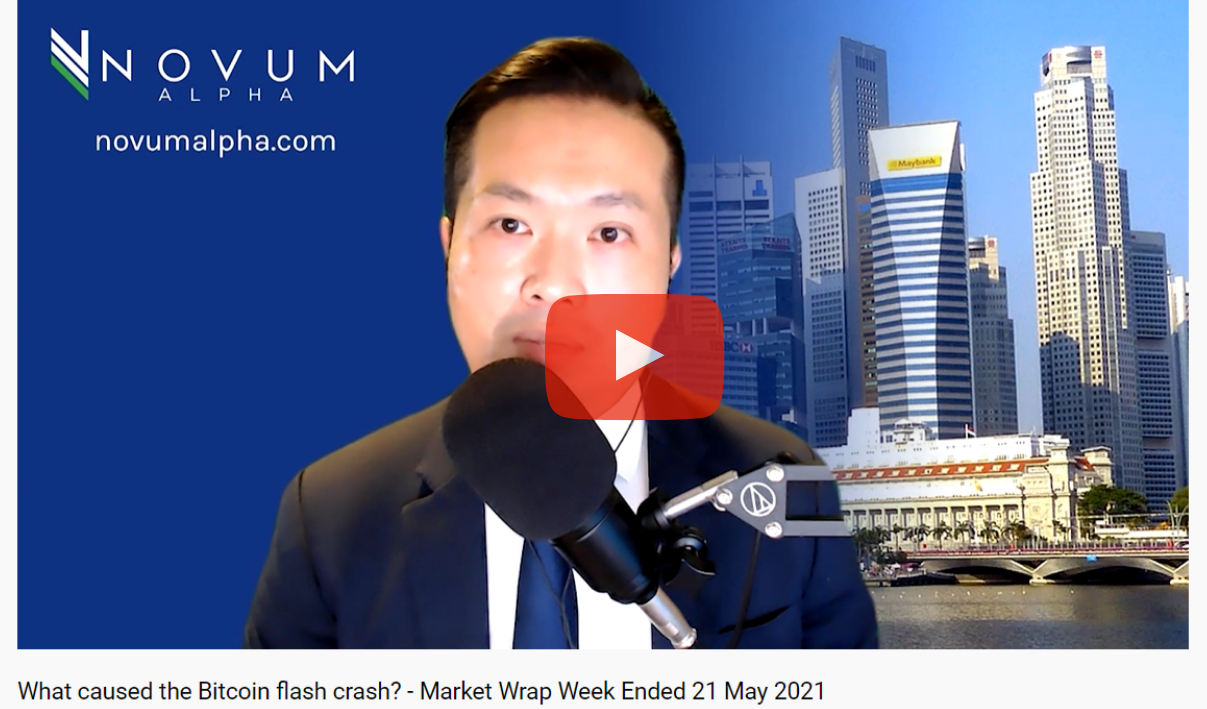|
A wonderful weekend to you as markets close a mixed bag, and with more investors in the U.S. and Europe heading off to enjoy a bit of summer respite, now that many parts of the global economy are reopening.
In brief (TL:DR)
- U.S. stocks finished a mixed bag on Friday, with the blue-chip Dow Jones Industrial Average (+0.36%) up slightly on a rotating towards value stocks and the S&P 500 (-0.08%) and tech-centric Nasdaq Composite (-0.48%) lower as investors soured on growth stocks.
- Asian stocks generally finished higher on Friday on bargain hunting.
- The U.S. 10-year Treasury yield slipped to 1.619% (yields generally fall when bond prices rise) as investors rotated back to safe havens and traditional investment themes.
- The dollar rose against a basket of major trading partners on souring risk sentiment.
- Oil rebounded with July 2021 contracts for WTI Crude Oil (Nymex) (+2.65%) at US$63.58 as the summer driving season in the U.S. gets underway.
- Gold slipped with Aug 2021 contracts for Gold (Comex) (-0.27%) at US$1,879.90 in line with a strengthening dollar and eased inflation fears.
- Bitcoin (-9.59%) crashed into the weekend to US$36,000 in a sharp reversal and in line with a broader selloff in tech stocks, as inflows into exchanges picked up pace against outflows (inflows suggest that investors are looking to sell Bitcoin in anticipation of lower prices).
|
 |
In today's issue...
- Retail Investors Have Gone for the Summer
- Time for Tech in Asia
- A Chinese Crackdown Couldn't Hurt Bitcoin Could It?
|
 |
|
Market Overview
Sell in May and go away.
Which is exactly what investors appear to be doing.
With many parts of the U.S. and the United Kingdom reopening, as well as sections of Europe, pandemic-fatigued investors are finally getting the respite that they wanted, enjoying a bit of time in the sun.
And that shift has seen a drop off in volumes, a slide in flows towards the more speculative ends of the market, including meme stocks and pandemic favorites as well as cryptocurrencies.
Whether or not this shift is a durable one or part of a secular trend is less certain.
Investors mostly started trading stocks and other risky assets because pandemic lockdowns left them bored.
But now that they've had a taste of risk, it's unclear whether the sudden drop off in risk appetite is more a function of the summer season, or part of a broader unwinding in retail investor participation.
In Asia, stocks were firmer heading into the weekend with Tokyo's Nikkei 225 (+0.78%) up, while Sydney’s ASX 200 (+0.15%) and Hong Kong's Hang Seng Index (+0.03%) all up, while Seoul's Kospi Index (-0.19%) was down slightly.
|
Did you miss us at the World Family Office Forum? Watch it here...
|
 |
 |
 |
1. Retail Investors Have Gone for the Summer
-
Retail flows have shifted into "boring" ETFs as many disengage for the summer
-
The old adage "sell in May and go away" may ring true, now that the U.S. is starting to reopen in earnest, investors are parking cash
As bars and restaurants across the United States reopen, and entertainment venues fill up, thousands of retail investors, who took to zero-fee trading apps like Robinhood to wile away the time during pandemic-induced lockdowns are now acting more and more like pension funds – they’re plowing money into boring stock ETFs.
With places to go and people to see, retail investors with a “go big or go home” (to be fair everyone was at home) ethos are now driving demand for ETFs that track large indices like the S&P 500 and the tech-heavy Nasdaq 100.
Even as cryptocurrencies and meme stocks slid last week, according to Vanda Research, retail investors pushed some US$434 million into State Street’s SPDR S&P 500 ETF Trust (SPY) and US$235 million into Invesco’s QQQ Trust Series 1 (QQQ), suggesting that they are either fresh out of ideas or taking a break.
With cryptocurrencies and meme stocks already done and dusted, what could be next?
Inflation concerns have recently triggered a massive sell off of riskier equities, and cryptocurrencies like Bitcoin were whipsawed.
Even retail investor favorites like Facebook (-0.75%), Apple (-1.48%), Amazon (-1.37%), Google (-0.56%), Microsoft (-0.53%) and Tesla (-1.01%) are showing signs of weakness.
And with the S&P 500 up over 40% over the past year, many retail investors may be subscribing to the age-old stock market adage of “sell in May and go away,” to head out and enjoy the summer, leaving the management of their investments to the market.
While retail investors summer easily, they’ll be back, and in greater numbers.
|
Did you miss us at the World Family Office Forum? Watch it here...
|
 |
 |
 |
2. Time for Tech in Asia
-
Asian tech companies have taken a beating and are now approaching attractive valuations
-
Chinese internet giants, Taiwanese and South Korean seminconductor manufacturers are looking attractive longer term
Asian tech company CEOs could only salivate as global investors poured billions of dollars into U.S. tech giants, whilst they were left out in the cold where there was weeping and gnashing of teeth.
Throughout most of the pandemic, U.S. tech firms enjoyed sharp rallies while most of Asia’s tech companies were mostly left out of the party, as Asia struggled initially through the pandemic.
Yet during the global selldown in speculative assets, these Asian tech giants which had never really enjoyed all that much of an upside were not left unscathed either.
But now that the dust has settled, some plucky investors are spotting pockets of opportunity, with some investment banks and asset managers suggesting that losses in Asian tech stocks were substantial enough to warrant a closer look as Asian tech exporters are key to the global recovery.
So far, Taiwanese shares, Japanese startups and Chinese internet stocks have been the most badly hit, with the MSCI Asia Pacific Information Technology Index falling as much as 8.4% before paring losses.
But the secular trends for tech stocks, and in particular Asian tech stocks, have not dissipated.
Digitalization has accelerated in the past year and is set to continue, while advances in AI and machine learning, autonomous vehicles and virtual reality are likely to serve as major growth drivers in the longer term.
IoT (Internet-of-Things) will also drive demand for chip production, which is almost entirely centered around Asian manufacturing hubs and which China continues to push for self-sufficiency in.
The global shortage of chips, which will eventually normalize, demonstrates just how crucial semiconductor manufacturing and equipment makers are to the global economy, and especially for chipmakers, size matters.
And perhaps the most visible structural trend in Asian technology this year has been the realization of Taiwan’s increasing dominance in the chip manufacturing industry, serving major U.S. tech giants including Apple, Nvidia (+2.60%) and AMD (-1.14%).
Yet that didn’t spare Taiwan Semiconductor Manufacturing Co. (+1.06%) a deep rout this past month, mostly because of resurgent coronavirus infections on the island, but longer term presents excellent growth potential.
Fresh measures to restrict the spread of the coronavirus in Singapore, Taiwan, Malaysia and Japan are making investors jittery, at a time when summer in the northern hemisphere beckons, and most investors are heading off to the sidelines, but could also present excellent buying opportunities.
With close proximity to the world’s second largest economy, Asia’s tech giants are well-positioned, regardless of geopolitical tensions, to ride the next wave of growth and valuations have come down in many cases to attractive levels.
|
 |
 |
 |
3. A Chinese Crackdown Couldn't Hurt Bitcoin Could It?
- Bitcoin sell off largely a symptom of broader market moves to exit for summer
- Chinese moves in and of themselves will do little to undermine the integrity of the Bitcoin blockchain, but a lack of understanding of blockchain technology will still fuel a sell off in Bitcoin
The weekends are generally a worrying time for cryptocurrency investors and this weekend looks to be no different, with Bitcoin buckling to selling pressure on fresh warnings by Chinese officials over cracking down on cryptocurrencies.
On Friday, China’s State Council reiterated its call to curtail Bitcoin mining and trading, in a week that saw the Biden administration suggest that cryptocurrency transactions over US$10,000 may be subject to tax.
But the selldown of the benchmark cryptocurrency also revealed the lack of knowledge and understanding that investors generally have of the nascent asset class.
Cryptocurrency trading has been banned by China since 2017, yet the Chinese are also some of the biggest traders globally and run the world’s biggest cryptocurrency exchanges, albeit offshore.
None of the restrictions against cryptocurrencies being threatened by Beijing are new and even cryptocurrency miners in China, particularly in the western regions, ply their trade covertly, bribing local officials where they have to, in order to operate in secret.
Even if Beijing were to crack down on Bitcoin mining, all that would result in would be a drop off in hashrate (a measure of the computational power used when mining Bitcoin) a reduction in Bitcoin difficulty (a measure of how difficult it is to secure the Bitcoin blockchain to secure mining rewards), and none of these would materially affect the ability of Bitcoin to function.
If nothing else, an active crackdown on Bitcoin in China would ironically increase the demand for Bitcoin by Chinese nationals (that which is forbidden is often most desired) and act as a stress test on Bitcoin’s fundamental value proposition – the ability to continue operating regardless of governmental intervention.
Beijing has long been disdainful of the relative anonymity provided by Bitcoin and other cryptocurrencies, and repeatedly warned that financial institutions weren’t allowed to accept it for payment.
But China is also home to possibly the world’s largest concentration of cryptocurrency miners, who gobble up massive amounts of power from coal-fired power stations in the country’s western regions.
Beijing wants to curb the country’s greenhouse gas emissions, but local and provincial officials in China’s western region, which is rich in coal, also need the revenues from power generation to fill their coffers, and enforcement to curb emissions is often more political theater than active policing.
It’s not as if provincial and local officials in regions like Xinjiang and Inner Mongolia don’t know where the cryptocurrency mining facilities are, it’s more that they know how much these industrial activities contribute to their revenues and are reluctant to truly shut them down.
Bitcoin was designed for this – it was designed so that even if a massive chunk of mining nodes was taken offline, it’s decentralization would allow the network to survive – the Bitcoin difficulty would adjust downwards and other nodes would take the place of those that were taken down.
Think of it as redundancy.
Now if investors understood how the Bitcoin blockchain worked, no amount of threats from any government would have any material impact on Bitcoin’s ability to do precisely what it was designed to do.
Where intervention would hurt would be making it difficult to swap fiat currencies for cryptocurrencies, but as has been demonstrated by the past decade, when there's sufficient determination to do so, that can be achieved as well.
|
What can Digital Assets do for you?
While markets are expected to continue to be volatile, Novum Alpha's quantitative digital asset trading strategies have done well and proved resilient.
Using our proprietary deep learning and machine learning tools that actively filter out signal noise, our market agnostic approach provides one of the most sensible ways to participate in the nascent digital asset sector.
If this is something of interest to you, or if you'd like to know how digital assets can fundamentally improve your portfolio, please feel free to reach out to me by clicking here.
|
 |
|
Looking to trade cryptocurrency yourself? Then why not try CryptoHero, a member of the Novum Group.
Enjoy some of the high performing algorithms that Novum Alpha uses, absolutely free!
Because you can't be up 24 hours trading cryptocurrency markets, CryptoHero's free bots do the trading for you.
Simple and intuitive for crypto beginners to set up and run, CryptoHero is currently available on the Web and iOS with an Android version ready in 2021.
Try our one click copy bot settings with the button below and enjoy 1-month Premium Subscription absolutely free!
|
|











